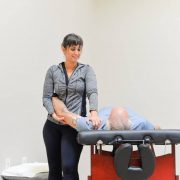Three Causes of Morning Neck Pain and What to Do
Waking up with morning neck pain puts a huge damper on your day right from the start. While neck pain may not be at the top of the list when it comes to debilitating musculoskeletal problems (aka people tend to just “live” with it) – it still impacts between 10-20% of the population at any given time – so it’s worth discussing.
One of the most common problems I see with those suffering from neck issues is that seemingly out of nowhere they can go to bed feeling great – but wake up with a stiff and painful neck that can last up to a day or two. When this pattern starts to repeat itself and goes on for too long – you can end up with a chronic neck problem that doesn’t just show up in the morning – but will start to impact your day-to-day life and get in the way of things you love to do.
Here are Three Common Causes of Morning Neck Pain and What you can Do:
1. Sleeping position
Any joint – including those that make up your neck – will feel strained after being in a prolonged position for too long. In a healthy, uncompromised neck – this is fine if it happens on occasion. But if it’s happening once per month or more – it’s time to address your sleeping position.
Those that like to sleep on their stomachs, or with multiple pillows under their head, are going to have the biggest problems. When you sleep, you want to get your neck as close to what I call a “neutral spine” as possible. That means your neck feels relaxed, maintains its natural curves, and your ears, neck, and shoulder will be aligned on top of one another. I find the best way to achieve this is by sleeping on your side – or on your back with just one pillow. If you’re a multi-pillow type of person – make sure you’re using the second pillow to hug and support your arm – or in between your legs – not underneath your head.
2. Clenching Your Teeth
While many people tend to associate clenching your teeth with TMJ – or jaw dysfunction, it can cause neck problems as well. When you clench your teeth, you’re also tensing the muscles around your neck. If you do this every night, and for prolonged periods, your neck is going to become very unhappy and start to have problems of its own.
Many folks are unaware they are clenching their teeth at night. But some signs this could be happening to you include tense or fatigued jaw muscles in the morning, walking up with headaches, or a stiff and painful neck and shoulder when you first wake up. Clenching teeth is often a reaction to stress – so having a good end of day routine could really help with this problem. Be sure to shut off TV and electronics at least one hour before bedtime. Practicing some meditation and/or relaxation breathing just before bed could help too. If all else feels, a night guard could help as well. It won’t stop you from clenching completely, but it will protect your teeth and could minimize your neck pain.
3. A Bulging Disc
This isn’t spoken about too often, but if you’ve got a bulging or problematic disc in your neck – this could be the reason you’re waking up with a stiff and painful neck in the morning. When you lie down and “unload” your spine for a period of time – such as at night while sleeping – our intervertebral discs hydrate and actually get larger. If you wake up with a sudden movement – this could be all it takes to “pinch” that disc and cause your neck to feel “locked up” and with sudden pain.
Now, don’t feel like you need to go running to the doctor for an MRI to figure this out. It’s not necessary. Most people have bulging dics occurring normally as they age throughout their entire spine. They only become a problem when you don’t take care of your spine. When it comes to your neck, the biggest risk factors for turning a normal bulging disc into a painful and problematic one include behaviors such as looking down at your phone, tablet, or computer for too long and not being respectful of the fact that a healthy neck needs to move in all directions – not just forward and down. Doing some simple chin tucks frequently throughout the day and making sure your upper back stays flexible can go a long way in preventing (normal) bulging discs from becoming a problem.
I hope these tips help shed some light on why you might be waking up with morning neck pain and most importantly – what you can do about it. If you try some of these remedies and still find yourself unsuccessful – then it’s time to talk to a mechanical pain expert. There’s no need to rely on pain pills or expensive tests and procedures to resolve morning neck pain. Most of the time, problems like I’ve just described can 100% be resolved naturally and with the right “movement therapy”.
Are you local to Portsmouth, NH?
Consider speaking to one of my specialists. Tell us everything that’s been going on with you, and determine for yourself if we’re the best people to help you.
It’s a completely free, no-obligation appointment that will give you all the information you need to make the BEST decision for YOUR health – whether that’s working with us or not!
Click here to book a free Discovery Visit.
Dr. Carrie Jose, Physical Therapist and Pilates expert, owns CJ Physical Therapy & Pilates in Portsmouth and writes for Seacoast Media Group. To request a free copy of one of her guide to neck and shoulder pain CLICK HERE or to get in touch, email her at [email protected].




